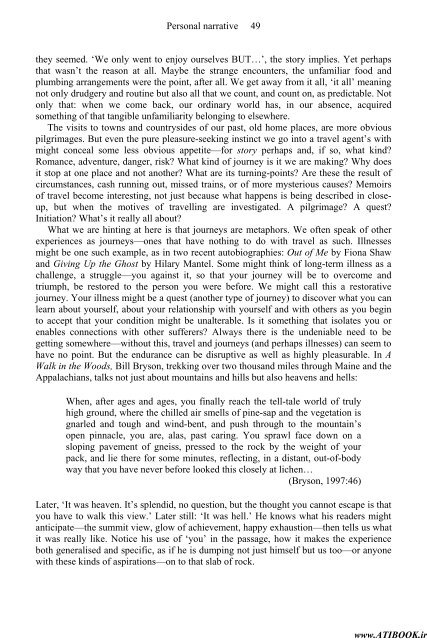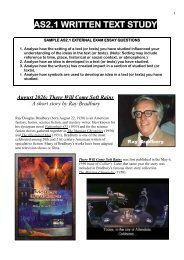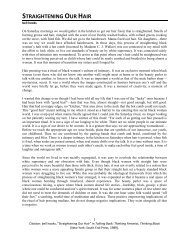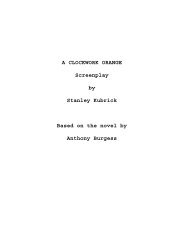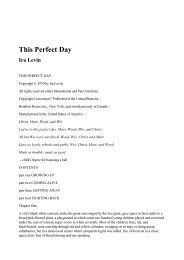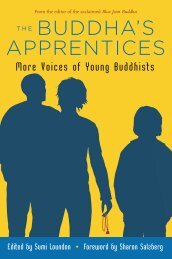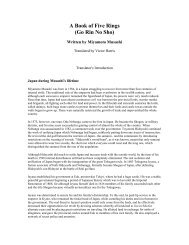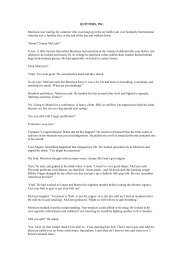9780415317856_the_routledge_creative_writing_coursebook
9780415317856_the_routledge_creative_writing_coursebook
9780415317856_the_routledge_creative_writing_coursebook
You also want an ePaper? Increase the reach of your titles
YUMPU automatically turns print PDFs into web optimized ePapers that Google loves.
www.ATIBOOK.irPersonal narrative 49<strong>the</strong>y seemed. ‘We only went to enjoy ourselves BUT…’, <strong>the</strong> story implies. Yet perhapsthat wasn’t <strong>the</strong> reason at all. Maybe <strong>the</strong> strange encounters, <strong>the</strong> unfamiliar food andplumbing arrangements were <strong>the</strong> point, after all. We get away from it all, ‘it all’ meaningnot only drudgery and routine but also all that we count, and count on, as predictable. Notonly that: when we come back, our ordinary world has, in our absence, acquiredsomething of that tangible unfamiliarity belonging to elsewhere.The visits to towns and countrysides of our past, old home places, are more obviouspilgrimages. But even <strong>the</strong> pure pleasure-seeking instinct we go into a travel agent’s withmight conceal some less obvious appetite—for story perhaps and, if so, what kind?Romance, adventure, danger, risk? What kind of journey is it we are making? Why doesit stop at one place and not ano<strong>the</strong>r? What are its turning-points? Are <strong>the</strong>se <strong>the</strong> result ofcircumstances, cash running out, missed trains, or of more mysterious causes? Memoirsof travel become interesting, not just because what happens is being described in closeup,but when <strong>the</strong> motives of travelling are investigated. A pilgrimage? A quest?Initiation? What’s it really all about?What we are hinting at here is that journeys are metaphors. We often speak of o<strong>the</strong>rexperiences as journeys—ones that have nothing to do with travel as such. Illnessesmight be one such example, as in two recent autobiographies: Out of Me by Fiona Shawand Giving Up <strong>the</strong> Ghost by Hilary Mantel. Some might think of long-term illness as achallenge, a struggle—you against it, so that your journey will be to overcome andtriumph, be restored to <strong>the</strong> person you were before. We might call this a restorativejourney. Your illness might be a quest (ano<strong>the</strong>r type of journey) to discover what you canlearn about yourself, about your relationship with yourself and with o<strong>the</strong>rs as you beginto accept that your condition might be unalterable. Is it something that isolates you orenables connections with o<strong>the</strong>r sufferers? Always <strong>the</strong>re is <strong>the</strong> undeniable need to begetting somewhere—without this, travel and journeys (and perhaps illnesses) can seem tohave no point. But <strong>the</strong> endurance can be disruptive as well as highly pleasurable. In AWalk in <strong>the</strong> Woods, Bill Bryson, trekking over two thousand miles through Maine and <strong>the</strong>Appalachians, talks not just about mountains and hills but also heavens and hells:When, after ages and ages, you finally reach <strong>the</strong> tell-tale world of trulyhigh ground, where <strong>the</strong> chilled air smells of pine-sap and <strong>the</strong> vegetation isgnarled and tough and wind-bent, and push through to <strong>the</strong> mountain’sopen pinnacle, you are, alas, past caring. You sprawl face down on asloping pavement of gneiss, pressed to <strong>the</strong> rock by <strong>the</strong> weight of yourpack, and lie <strong>the</strong>re for some minutes, reflecting, in a distant, out-of-bodyway that you have never before looked this closely at lichen…(Bryson, 1997:46)Later, ‘It was heaven. It’s splendid, no question, but <strong>the</strong> thought you cannot escape is thatyou have to walk this view.’ Later still: ‘It was hell.’ He knows what his readers mightanticipate—<strong>the</strong> summit view, glow of achievement, happy exhaustion—<strong>the</strong>n tells us whatit was really like. Notice his use of ‘you’ in <strong>the</strong> passage, how it makes <strong>the</strong> experienceboth generalised and specific, as if he is dumping not just himself but us too—or anyonewith <strong>the</strong>se kinds of aspirations—on to that slab of rock.


